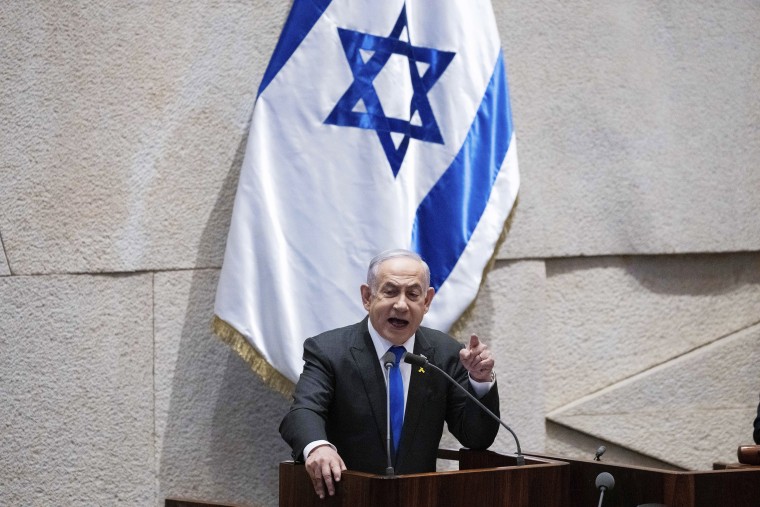Israel's parliament, the Knesset, on Thursday voted overwhelmingly to reject the establishment of a Palestinian state, reflecting the deepening decline in support for a two-state solution among wider Israeli society.
Of the 120-member legislative body, 68 voted in support of the resolution, which says a Palestinian state would "pose an existential danger to the State of Israel." Nine members opposed it, while others did not vote.
The vote came as Israeli Prime Minister Benjamin Netanyahu prepares to travel to the United States to address a joint session of Congress and meet with President Joe Biden, who has been vocal in pushing for a two-state solution to the Israeli-Palestinian conflict.
It is unclear whether Biden's recent Covid-19 diagnosis will affect plans for the meeting. But the outcome of Thursday's vote is likely to deepen concerns among Democrats expected to attend Netanyahu's speech to Congress next Wednesday, said Bilal Y. Saab, a former U.S. Defense Department official and head of the U.S.-Middle East practice of Trends Research and Advisory, a consulting firm based in Abu Dhabi, United Arab Emirates.
"The timing of it is a little bit puzzling," Saab said. "This will clearly embarrass the president here and put him in a very difficult position with respect to his own party, the Democrats."
He said the vote could also signal that Israeli lawmakers have confidence that "the next president is going to be Donald Trump" and that they're willing to "put all their eggs in one basket, which is the Republican Party."
Meanwhile, as the Biden administration looks to propel efforts to negotiate a cease-fire deal between Israel and Hamas, Israel's far-right national security minister, Itamar Ben-Gvir, visited Jerusalem's most sensitive holy site Thursday to pray for the return of hostages held by Hamas in the Gaza Strip in a move that threatened to raise tensions in the region.
The visit drew a swift response from Hamas, which said it condemned the move as a "dangerous provocation and escalation."

Ben-Gvir said in a statement that he had visited the contested compound of the Al-Aqsa Mosque to pray for the return of hostages, “but without a reckless deal, without surrendering.”
The resolution against Palestinian statehood was co-sponsored by parties within Netanyahu's coalition government, which includes far-right parties.
Knesset members from opposition leader Yair Lapid's center-left Yesh Atid party refrained from voting in the measure, though Lapid had previously supported a two-state solution. The nine lawmakers who voted in support of a Palestinian state were members of the leftist Hadash-Ta’al and Labor parties and Ra’am, a conservative Islamist party, according to Israeli newspaper The Times of Israel.
"The Knesset of Israel firmly opposes the establishment of a Palestinian state west of Jordan," the resolution states, according to the Knesset's website, saying it would "pose an existential danger to the State of Israel and its citizens, perpetuate the Israeli-Palestinian conflict and destabilize the region."
The measure claims it would "only be a matter of short time until Hamas takes over the Palestinian state" and reiterated comments by Netanyahu that "promoting the idea of a Palestinian state at this time will be a reward for terrorism and will only encourage Hamas and its supporters to see this as a victory."
The vote approving the resolution comes as a growing number of countries have expressed support for the establishment of a Palestinian state. About two-thirds of the U.N.'s 193 member states now formally recognize a Palestinian state.
Knesset member Ze'ev Elkin suggested that those who support a Palestinian state but chose to abstain from voting likely did so to avoid having to "come to the Israeli public and say that they do not reject the establishment of a Palestinian state, that is unacceptable even within their own public."
A Pew Research Center poll conducted in March and early April found that the share of Israelis who believed a way could be found for Israel and an independent Palestinian state to "coexist peacefully with each other" had dropped to 26%, down from 35% last year, before Hamas' Oct. 7 attacks and Israel's monthslong offensive in Gaza.
The latest findings, which polled just over 1,000 Israelis in Hebrew and Arabic, also represented a significant decline from 2013, when around half of Israelis said they believed peaceful coexistence was possible when the question was first asked, according to Pew.
On the international stage, Netanyahu's government has faced growing criticism and isolation over the Israeli military's deadly offensive in Gaza, which has left much of the enclave destroyed. Meanwhile, Israel has faced growing pressure to present a clear plan for what happens when the war comes to an end, with Israeli opposition to a two-state solution complicating paths to a viable diplomatic resolution.
Addressing the Knesset on Wednesday, Netanyahu defended his handling of the war in Gaza, saying Israeli forces had been effective in putting Hamas "under pressure" amid negotiations for a cease-fire deal that would bring an end to fighting in Gaza and see hostages who remain held by Hamas in the enclave released.
